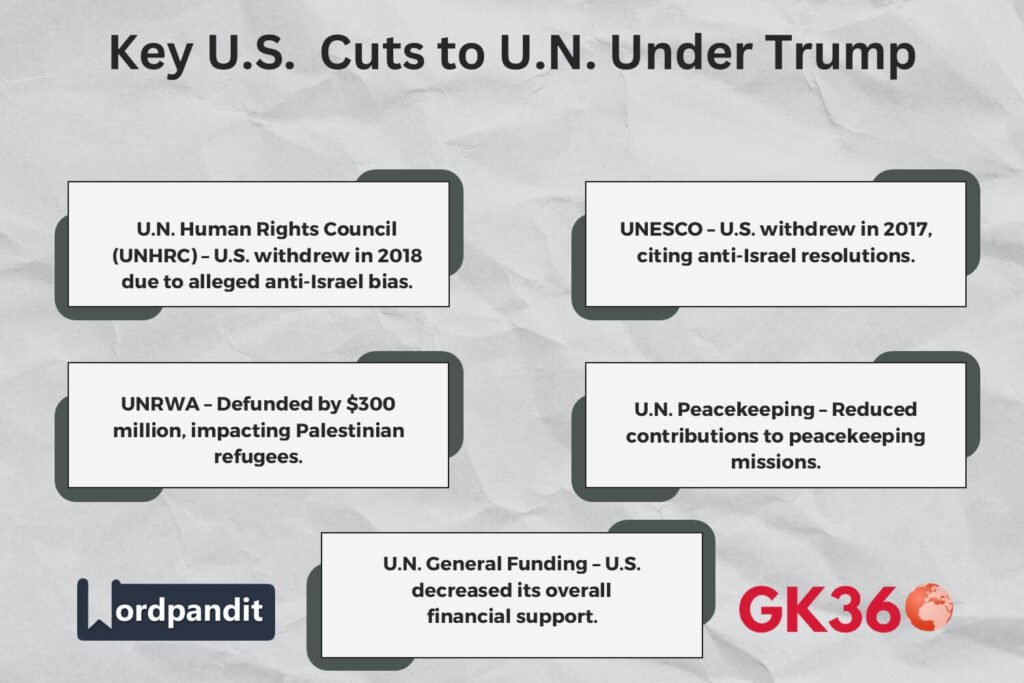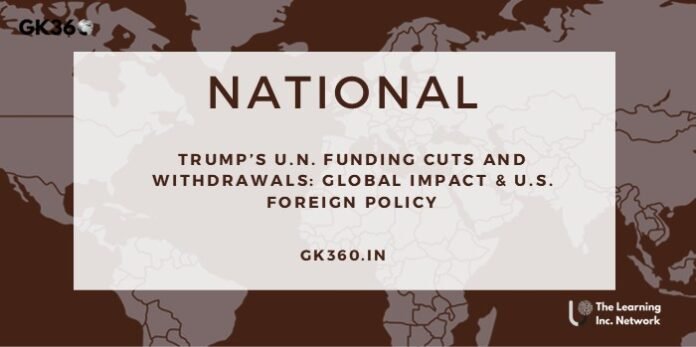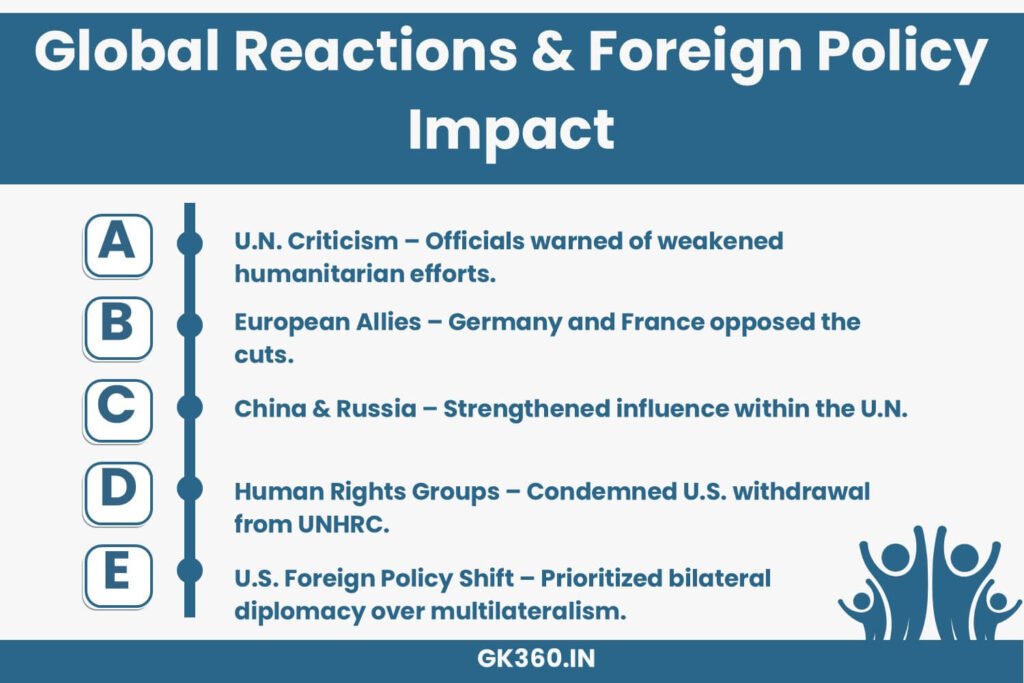Trump’s U.N. Funding Cuts and Withdrawals: Global Impact & U.S. Foreign Policy
Introduction
Former U.S. President Donald Trump’s executive order reshaped the country’s involvement in the United Nations, triggering a major shift in global diplomacy. The directive led to a reassessment of U.S. contributions to U.N. programs, resulting in significant funding cuts and the withdrawal from key organizations such as the U.N. Human Rights Council (UNHRC) and the United Nations Relief and Works Agency for Palestine Refugees (UNRWA).
Trump’s administration justified these actions by citing inefficiency, financial mismanagement, and political bias within the U.N. However, the decision sparked widespread global debate, with critics warning of its long-term consequences on humanitarian efforts and U.S. diplomatic influence.
This article explores the rationale behind Trump’s executive order, the specific U.N. agencies affected, global reactions, and its implications for U.S. foreign policy.

Table of Contents
- Why Did Trump Cut U.N. Funding?
- Key Aspects of Trump’s Executive Order
- Global Reactions to Trump’s U.N. Policy
- Implications for U.S. Foreign Policy
- FAQs on Trump’s U.N. Policy
- Conclusion & Call to Action
Why Did Trump Cut U.N. Funding?
The Trump administration viewed the U.N. as an inefficient bureaucracy that often worked against U.S. interests. The main reasons cited for the funding cuts and withdrawals included:
Alleged Political Bias
- Trump argued that bodies like the UNHRC disproportionately targeted Israel while ignoring human rights violations in countries like China, Iran, and Venezuela.
Financial Mismanagement
- The U.S. was the largest contributor to U.N. programs, funding approximately 22% of the U.N. regular budget and 28% of U.N. peacekeeping efforts.
- Trump’s order aimed to reduce financial dependency on American taxpayers.
National Sovereignty Concerns
- The administration believed that U.S. foreign policy should be driven by direct alliances rather than multilateral institutions.
Key Aspects of Trump’s Executive Order
Review of U.S. Contributions to the U.N.
The executive order called for a comprehensive assessment of U.S. funding across U.N. programs. This included:
- The U.N. Human Rights Council (UNHRC) – Accused of bias against Israel.
- UNESCO (United Nations Educational, Scientific, and Cultural Organization) – Criticized for passing resolutions unfavorable to the U.S. and Israel.
- UNRWA (United Nations Relief and Works Agency for Palestinian Refugees) – Accused of financial mismanagement and ties to Hamas.
Withdrawal from the U.N. Human Rights Council
In 2018, the U.S. formally withdrew from the UNHRC, citing:
- ✔ Allegations of Anti-Israel Bias – The council passed numerous resolutions condemning Israel while failing to take strong action against other human rights violators.
- ✔ Lack of Reform – The U.S. pushed for reforms to improve transparency and accountability, but these demands were not met.
- ✔ Member Composition Issues – The council included countries like China and Saudi Arabia, which themselves had poor human rights records.
Defunding UNRWA: Impact on Palestinian Refugees
The Trump administration cut $300 million in U.S. aid to UNRWA, arguing that the agency:
- Was Ineffective – Critics claimed it perpetuated rather than solved the refugee crisis.
- Had Alleged Ties to Hamas – Israel accused UNRWA of employing individuals affiliated with the militant group.
- Lacked Financial Transparency – The U.S. argued that aid should be directed to other organizations with stricter oversight.
Reassessment of U.S. Participation in UNESCO
The Trump administration withdrew from UNESCO in 2017, citing:
- Allegations of Anti-Israel Resolutions – The agency recognized Palestinian heritage sites in ways that angered Israel and the U.S.
- Unfair Funding Contributions – The U.S. felt it was paying disproportionately more than other countries.
Global Reactions to Trump’s U.N. Policy
Official U.N. Response
The U.N. expressed deep concern over the U.S. decisions, emphasizing that American support was crucial for humanitarian efforts and international stability.
Allied Nations’ Concerns
- ✔ European allies, including Germany and France, criticized the funding cuts, warning of their impact on humanitarian efforts.
- ✔ Canada and Japan urged the U.S. to reconsider, emphasizing the importance of multilateral cooperation.
China and Russia’s Position
Trump’s withdrawal created a power vacuum that China and Russia quickly exploited by increasing their influence within U.N. bodies.
Response from Human Rights Organizations
- Amnesty International and Human Rights Watch condemned the U.S. withdrawal, stating that it undermined global efforts to hold governments accountable for human rights violations.
Implications for U.S. Foreign Policy
Diminished Global Influence
- U.S. withdrawals reduced its ability to shape international policies.
Financial Shifts in Humanitarian Aid
- Other countries had to step up, but funding gaps remained.
Bilateral Diplomacy Over Multilateralism
- The “America First” strategy emphasized direct negotiations with allies instead of working through U.N. institutions.
FAQs on Trump’s U.N. Policy
🔹 Why did Trump withdraw from the UNHRC?
The administration claimed it was biased against Israel and included members with poor human rights records.
🔹 What was the impact of defunding UNRWA?
It led to severe financial crises for Palestinian refugees, reducing access to food, healthcare, and education.
🔹 Did the U.S. completely leave the U.N.?
No, the U.S. remained a member but reduced its participation in key organizations.
🔹 How did Biden respond to Trump’s U.N. policies?
President Joe Biden reinstated funding for UNRWA and rejoined the UNHRC.
Conclusion & Call to Action
Trump’s executive order significantly altered U.S.-U.N. relations, reducing funding and limiting U.S. involvement in multilateral organizations. While his administration argued that these changes promoted financial efficiency and national sovereignty, critics warned of weakened global leadership and humanitarian setbacks.
Should the U.S. focus more on direct diplomacy or re-engage with global institutions? Share your thoughts in the comments below!
✅ For more insights on global politics, visit GK360.in!
Key Takeaways
| Aspect | Details |
|---|---|
| Rationale for Cuts | Trump cited inefficiency, political bias, and financial mismanagement. |
| Major U.N. Withdrawals | UNHRC (2018), UNESCO (2017), UNRWA (defunded), and peacekeeping budget cuts. |
| Global Response | U.N. and European allies criticized the decision; China & Russia expanded their influence. |
| Humanitarian Impact | Loss of U.S. funding weakened refugee aid and peacekeeping efforts. |
| Foreign Policy Shift | Moved from multilateralism to direct diplomacy with allies. |
| Biden’s Reversal | Rejoined UNHRC and restored UNRWA funding. |
Related Terms:
- Trump U.N. Funding Cuts
- U.S. Withdrawal from UNHRC
- U.N. Peacekeeping Budget Cuts
- U.S. Defunds UNRWA
- Trump Foreign Policy Changes
- Global Reactions to U.S. U.N. Cuts
- China and Russia U.N. Influence
- Biden Rejoins UNHRC
- U.S. Role in U.N. Diplomacy
- America First Foreign Policy






